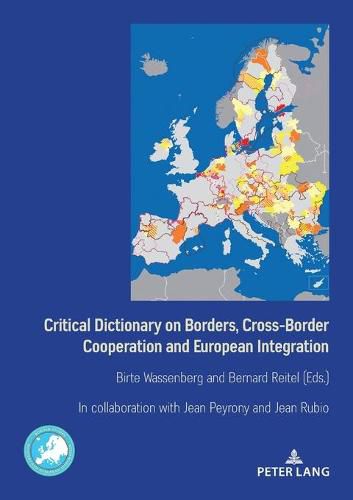Readings Newsletter
Become a Readings Member to make your shopping experience even easier.
Sign in or sign up for free!
You’re not far away from qualifying for FREE standard shipping within Australia
You’ve qualified for FREE standard shipping within Australia
The cart is loading…






This title is printed to order. This book may have been self-published. If so, we cannot guarantee the quality of the content. In the main most books will have gone through the editing process however some may not. We therefore suggest that you be aware of this before ordering this book. If in doubt check either the author or publisher’s details as we are unable to accept any returns unless they are faulty. Please contact us if you have any questions.
This Critical Dictionary on Borders, Cross-Border Cooperation and European Integration is the first encyclopaedia which combines two so far not well interconnected interdisciplinary research fields, i.e. Border Studies and European Studies. Organised in an alphabetical order, it contains 207 articles written by 115 authors from different countries and scientific disciplines which are accompanied by 58 maps. The articles deal with theory, terminology, concepts, actors, themes and spaces of neighbourhood relations at European borders and in borderlands of and around the European Union (EU). Taking into account a multi-scale perspective from the local to the global, the Critical Dictionary follows a combined historical-geographical approach and is co-directed by Birte Wassenberg and Bernard Reitel, with a large contribution of Jean Peyrony and Jean Rubio from the Mission operationnelle transfrontalere (MOT), especially for the cartography. The Dictionary is also part of four Jean Monnet activities supported by the Erasmus+ programme of the European Union for the period 2016-2022: two Jean Monnet projects on EU border regions (University Strasbourg), one Jean Monnet network (Frontem) and the Franco-German Jean Monnet excellence Center in Strasbourg, as well as the Jean Monnet Chair of Bernard Reitel on borders and European integration. Rather than being designed as an objective compilation of facts and figures, it should serve as a critical tool for discussion between researchers, students and practitioners working in the field of borders, cross-border cooperation and European Integration.
$9.00 standard shipping within Australia
FREE standard shipping within Australia for orders over $100.00
Express & International shipping calculated at checkout
This title is printed to order. This book may have been self-published. If so, we cannot guarantee the quality of the content. In the main most books will have gone through the editing process however some may not. We therefore suggest that you be aware of this before ordering this book. If in doubt check either the author or publisher’s details as we are unable to accept any returns unless they are faulty. Please contact us if you have any questions.
This Critical Dictionary on Borders, Cross-Border Cooperation and European Integration is the first encyclopaedia which combines two so far not well interconnected interdisciplinary research fields, i.e. Border Studies and European Studies. Organised in an alphabetical order, it contains 207 articles written by 115 authors from different countries and scientific disciplines which are accompanied by 58 maps. The articles deal with theory, terminology, concepts, actors, themes and spaces of neighbourhood relations at European borders and in borderlands of and around the European Union (EU). Taking into account a multi-scale perspective from the local to the global, the Critical Dictionary follows a combined historical-geographical approach and is co-directed by Birte Wassenberg and Bernard Reitel, with a large contribution of Jean Peyrony and Jean Rubio from the Mission operationnelle transfrontalere (MOT), especially for the cartography. The Dictionary is also part of four Jean Monnet activities supported by the Erasmus+ programme of the European Union for the period 2016-2022: two Jean Monnet projects on EU border regions (University Strasbourg), one Jean Monnet network (Frontem) and the Franco-German Jean Monnet excellence Center in Strasbourg, as well as the Jean Monnet Chair of Bernard Reitel on borders and European integration. Rather than being designed as an objective compilation of facts and figures, it should serve as a critical tool for discussion between researchers, students and practitioners working in the field of borders, cross-border cooperation and European Integration.